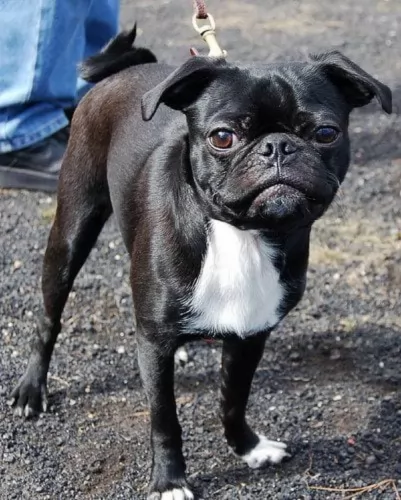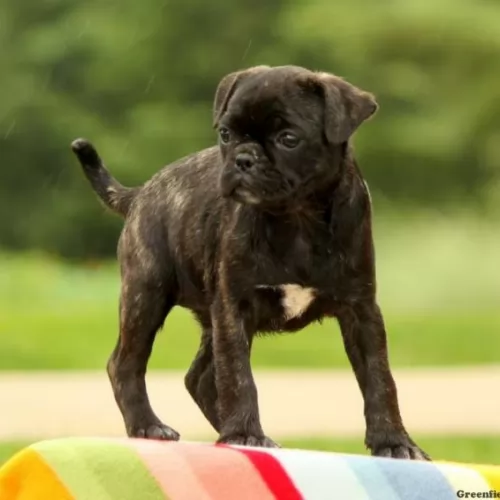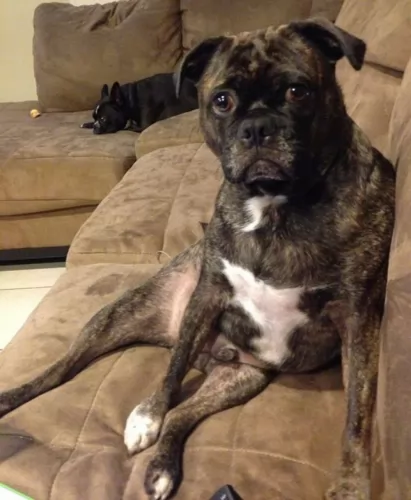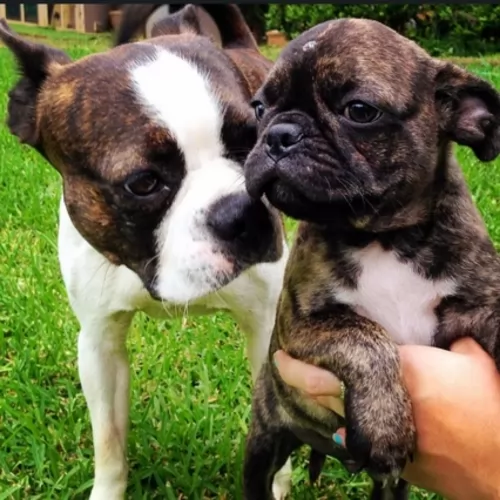 Petzlover
PetzloverBugg is originated from United States but Molossus is originated from Greece. Bugg may grow 38 cm / 14 inches shorter than Molossus. Bugg may weigh 44 kg / 97 pounds lesser than Molossus. Bugg may live 3 years less than Molossus. Both Bugg and Molossus has almost same litter size. Both Bugg and Molossus requires Moderate Maintenance.
 The Bugg is generally a cross between a Boston Terrier and a Pug. There is no clear history in terms of who started this hybrid dog that was recognized initially be the IDCR or International Designer Canine Registry in 2009. This very cute little dog has become increasingly popular in a very short period of time. Crossing these two breeds created a small dog that loves to sit in your lap as well a romp and play.
The Bugg is generally a cross between a Boston Terrier and a Pug. There is no clear history in terms of who started this hybrid dog that was recognized initially be the IDCR or International Designer Canine Registry in 2009. This very cute little dog has become increasingly popular in a very short period of time. Crossing these two breeds created a small dog that loves to sit in your lap as well a romp and play.
At this time the Bugg is recognized by several of the hybrid and designer registries and clubs. This would include in addition to the IDCR:
The Molossus has always been a popular dog and they have been around since ancient times. Mastiff type dogs are termed as Molossus.
Of course, when looking at the origin of the dog, there are many unsubstantiated claims about it. It has always been believed that the Molossus was a Mastiff-type dog, ferocious in battle. The Romans were dog breeders and recognized that the Molossus was a talented dog – good at guarding and herding.
Over the centuries the dog has changed but it is believed it was a Mastiff-type dog with a number of other breeds included in its origins such as the Rottweiler, Pug, Bulldog, Great Dane, Alano Espanol and Saint Bernard.
The Molossus isn’t a dog breed itself but rather a category that other dogs belong to. Today there are Molosser clubs and Molosser shows around the world.
 This cross between the Boston Terrier and Pug can have several different looks depending upon whether the individual dog resembles the Pug or the Boston more. Some usual but not always physical characteristics include curly tails, droopy ears and a stocky body in a small dog. They usually have soft, straight coats. Most Buggs look more like the Boston than the Pug although they have the more smashed muzzles and shorter legs of the Pug. The heads are round with almond shaped eyes.
This cross between the Boston Terrier and Pug can have several different looks depending upon whether the individual dog resembles the Pug or the Boston more. Some usual but not always physical characteristics include curly tails, droopy ears and a stocky body in a small dog. They usually have soft, straight coats. Most Buggs look more like the Boston than the Pug although they have the more smashed muzzles and shorter legs of the Pug. The heads are round with almond shaped eyes.
This Ancient dog breed from Greece has different descriptions of what it really looked like. It seems to have always been large to medium sized dog standing in the region of 50 to 76cm in height and weighing anything from 25 to 55kg.
The coat is mostly short and smooth and can be in a host of different colors. They are large boned dogs, solidly built with medium sized floppy ears, a short, thick neck, short, broad muzzle and a long tail which was later docked.
Molossers typically have heavy bones, pendant ears, and a relatively short and well-muscled neck, with a short, broad muzzle. These Molossers have always been used for a variety of jobs where strength, perseverance, speed and braveness are required. They have been used as rescue- and guard dogs, protecting livestock from predators.
The Molossus dogs all have the same kind of characteristics which have been bred into them. From their working days, they are known for their tremendous courage, taking on wild animals to protect their livestock.
They are territorial, wanting to protect their human family and home from intruders.They have also been bred to be loyal, loving family pets, and being highly affectionate, they want to be involved in the activities of the family.
This breed is gentle and loving, social and active and gets on well with other pets in the home as well as with children. They’re intelligent dogs and will need to be trained and socialized to ensure they are obedient and amicable with visitors to the home.
 This crossbreed is easily trainable and highly intelligent. They might be stubborn like the Boston or devoted like the Pug. They can have characteristics of both parents and be loving, playful lapdogs. They love to play with children, but they can be territorial like the Boston. The Bugg is a small dog with a big attitude. They are affectionate and sweet, friendly towards people and other animals. Since the Boston and the Pug have very similar characteristics and temperament, you can have a pretty good idea what your Bugg will be like.
This crossbreed is easily trainable and highly intelligent. They might be stubborn like the Boston or devoted like the Pug. They can have characteristics of both parents and be loving, playful lapdogs. They love to play with children, but they can be territorial like the Boston. The Bugg is a small dog with a big attitude. They are affectionate and sweet, friendly towards people and other animals. Since the Boston and the Pug have very similar characteristics and temperament, you can have a pretty good idea what your Bugg will be like.
The Molossus, contrary to what many people think, isn’t a vicious dog, but rather a good natured dog that makes a wonderful family pet.
These dogs are known also for being hard working dogs with characteristics of bravery. They are dogs who may look fairly tough, but they are actually gentle, calm and sensitive. It’s a bad upbringing from the owners that gives any dog bad characteristics.
Train your Molossus, have him socialized and be a responsible and loving dog owner, and these dogs promise to make you a splendid family pet.
These large dogs are particularly prone to health issues such as hip dysplasia, a genetic condition. A poor diet as well as environmental factors can contribute towards the disease too as well as rapid weight gain and obesity.
This disease develops because the dog’s hip joints haven’t developed properly. The hips then partially dislocate, and the dog has pain and battles to get around. If your dog shows signs of hip dysplasia, he will need to get to the vet to do a physical exam and come up with a treatment- and management program.
 Buggs love to eat and will anything you give them and some things that you don’t. They can become obese very easily so watch their food intake. These small dogs should be eating food made for small dogs. Feed them only ¾ to 1 and ½ cups of dry food per day split into two meals.
Buggs love to eat and will anything you give them and some things that you don’t. They can become obese very easily so watch their food intake. These small dogs should be eating food made for small dogs. Feed them only ¾ to 1 and ½ cups of dry food per day split into two meals.
The Bugg can inherit health problems from either the Boston or the Pug, or they may be healthier than either parent breed. Both of these parent breeds are given to Brachycephalic issues due to their mashed faces. They could face respiratory issues or eye issues because of this.
The Bugg is a very energetic and playful dog. They love to run, play and go on walks. Just one walk or play session per day is enough exercise for this little dog. You can easily have your play time inside if you don’t have a fenced yard. Because of their faces and breathing issues do not let them get overheated.
These dogs were bred to be working dogs and they have always spent their time outdoors performing a guarding or rescue role. Today they require a lot of exercise – walks and ball games – as they are dogs with a lot of energy.
Essentially a large breed, the Molossus will need a commercially manufactured food of high quality if you opt to make use of the convenience of these foods.
Make sure to choose one manufactured for large breeds and which is free of a host of bad ingredients such as corn, soy, wheat, dairy, artificial colors, sweeteners and preservatives.
You want dog food which is high in protein and fat. Try and include some home-cooked food such as boiled chicken, brown rice, pasta and vegetables. An ingredient to look out for in your dog’s food is omega-3 fatty acid to help keep the skin and coat shiny and healthy. Puppies particularly benefit from DHA, or Docosahexaenoic acid, a form of omega-3 fatty acid that is good for brain development.
Brushing the dog’s coat twice a week will be necessary to remove loose hairs, especially during the shedding period. When you brush him, check for ticks and fleas and speak to your vet about flea treatment if necessary. Ears and eyes should be checked and cleaned regularly.